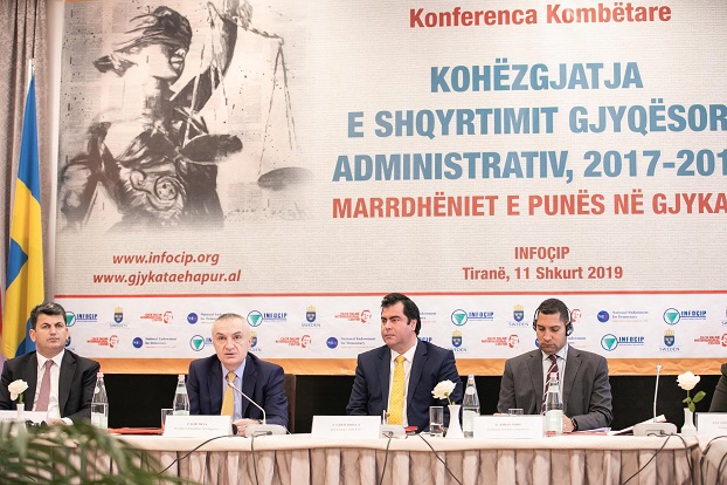Speech by Ambassador Johan Ndisi at conference on labour rights in administrative court proceedings in Albania, 11 February 2019

Check against delivery
Your excellency Mr president, dear partners and friends,
I am glad to be hear today to discuss the important issue of labour rights, and specifically the findings of INFOCIP on monitoring of administrative courts decisions on labour disputes.
My Government has a strong commitment to labour rights and social dialogue. This commitment lead to Sweden hosting the EU Social Summit for Fair Jobs and Growth in Gothenburg in November 2017, and it can also be seen in my Prime Minister's initiative, "The Global Deal" – with the objective of jointly addressing the challenges in the global labour market and enabling all people to benefit from globalisation.
The reason for this engagement is that fair and decent terms and conditions on the labour market are cornerstones for high producitivity in an economy. Fair terms creates predictability for employees – contributing to a secure working environment. This holds true for Sweden, as well as Albania or elsewhere.
Just like in other countries, the state is the major employer in Albania with over 110 000 employees. Public officials therefore plays a crucial role for the country.
Sweden is no different. The civil servants constitute the backbone of the public administration. Let me illustrate this with an an example. In total, the Swedish Foreign Service has 2600 employees with 15 people being politically apointed as part of the cabinet of the three Ministers who lead the Ministry for Foreign Affairs – the Minister for Foreign Affairs, the Minister for Trade and the Minister for Development. This means that there is hardly any turnover when we have a shift of Government. Not having a big turnover of staff, based on political affiliation, creates stability and also builds trust among the general public for public institutions. I mention this knowing that the role of the public administration will become even more crucial when Albania opens accession negotiations. Furthermore, the capacity of the civil service will determine the speed of the negotiations.
With the state being a main employer also brings with it a major responsibility. The state will need to be the main guarantor of labour rights. However, as findings from INFOCIP proves, we see excessive numbers of unlawful dismissals bringing high financial costs to the taxpayer but also affecting the officals and their families. This affects the trust towards public institutions.
As you know, Sweden is a strong supporter of the justice reform but also a strong supporter of the public administrative reform in Albania.
We look forward to both these reform processes moving forward. Their implementation are an important foundation in order to put in place a more efficient public administration that safeguards labour rights but also well functioning courts which can quickly resolve any dismissals which are deemed in breach of the law.
It is in this light that the conference today is important as it highlights an area which will be fundamental in the further development of the country.
Thank you.